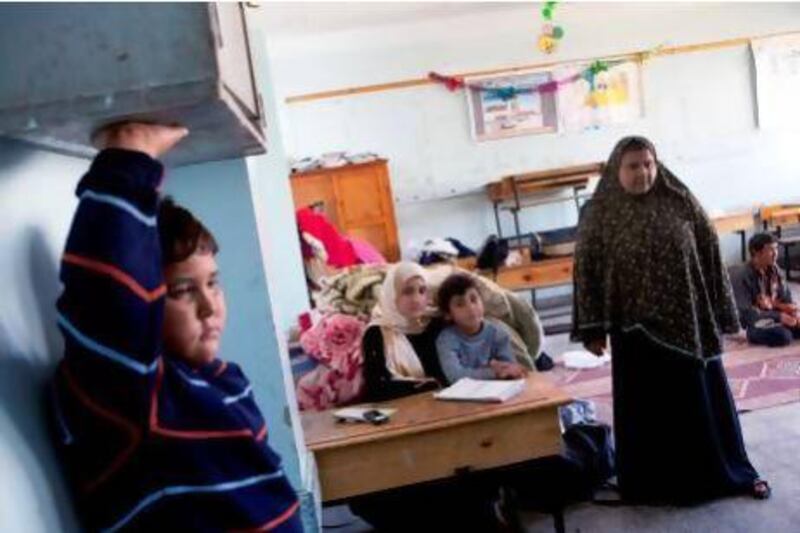GAZA CITY // They left their homes on foot, by car and in donkey carts.
Before last night's truce was announced, the eighth day of Israel's military campaign against the Gaza Strip forced a huge number of Palestinians from the enclave's northern areas to Gaza City to seek shelter in schools run by the United Nations.
Groups of 20 to 30 refugees squeeze into classrooms at the schools to escape the particularly intense volleys of Israeli strikes that have hammered the north of the besieged Palestinian territory ruled by Hamas.
About 10,000 Palestinians had sought refuge in 12 schools by yesterday, the UN said.
Heba Al Attar said she had taken no chances when Israel began showering her community of Atatra, in the northern Gaza Strip, with leaflets warning residents to leave the area immediately.
"I gathered the kids and we left within an hour," said Mrs Attar, 29, a mother of four now living in the New Gaza Preperatory School for Boys, which is run by the UN's Relief and Works Agency.
As many as 1,800 people are sheltering at the facility, UN officials said. Unlike during Israel's punishing war on Gaza four years ago, Mrs Attar and tens of thousands of Palestinians in Gaza's north have opted not to test Israel's threats of a ground invasion.
Their communities of tomato and cucumber farmers would be the first to face the assault should it come.
They began leaving en masse on Tuesday, forming kilometre-long traffic queues as they scurried for cover in Gaza City.
Next to the busy roads, pavements were crowded with donkeys and horses pulling wooden carts.
"When we see these papers [dropped by Israelis], the only thing we experience is fear," said Mrs Attar. "We know we have to leave."
Supermarkets throughout Gaza are shuttered. Milk supplies are diminishing and fruit and vegetables are scarce.
Moreover, beds, let alone blankets, are in short supply for the thousands of people forced to sleep next to each other on the hard classroom floors.
Zahiya Abu Halima tossed and turned on Monday night. The 80-year-old grandmother spent the evening at Gaza City's Beach Elementary School without a blanket. "My body was cold," she said.
Yesterday, she stood in a first-floor classroom carpeted by rugs that her family had managed to take as they fled their village of Beit Lahia. Children laughed and played in the crowded hallways but she watched them with a solemn expression. "I want to go back home," she said.
Shaheen Khalil, a researcher for the Palestinian Centre for Human Rights, believes the total number of internally displaced Palestinians at UN schools in Gaza City to be as high as 20,000.
That number does not account for the possibly thousands of others staying with friends and family elsewhere in the enclave, he said.
By the end of Israel's 2008-2009 war here, he said, as many as half a million people had been displaced.
"The situation is rapidly depleting supplies of food and services available for people here," said Mr Khalil while surveying the crowds at the New Gaza Preparatory School. "Men were forced to sleep outside on tables, drinking-water was only delivered today, and there are only three or four bathrooms here for more than 1,000 people."
Aid agencies echo his concerns. On Monday, 38 organisations, including Oxfam and Mercy Corps, warned of a "humanitarian disaster" in the enclave.
Israel's economic blockade has compounded the plight of Gaza's residents.
For Rana Al Helou, the mother of triplets, the paramount concern is safety. Air strikes at her home in the northern Jabalia refugee camp compelled her to join her parents in Gaza City's Tal Al Hawa neighbourhood four days ago.
Sixty members of her extended family sleep in the four-level home now, crowded into the central rooms to avoid debris flying through walls and windows from the air strikes that pound their neighbourhood every night. The area is full of government buildings affiliated with Hamas.
"I don't feel safe here or anywhere," she said. "All we want is a hudna [ceasefire]," she said.
At the preparatory school, Mrs Attar worries about her five-year-old son, Hassan, who had become feverish.
"I'm not afraid of dying," she said, pushing back his hair from his sweaty forehead. "It's my children. They don't understand why any of this is happening."
[ hnaylor@thenational.ae ]
Follow
The National
on
[ @TheNationalUAE ]
& Hugh Naylor on
[ @HughNaylor ]





